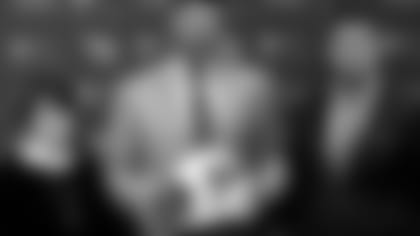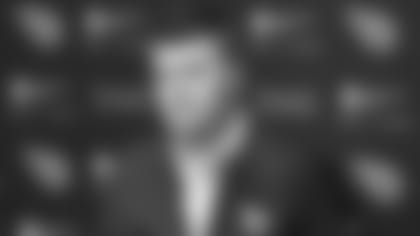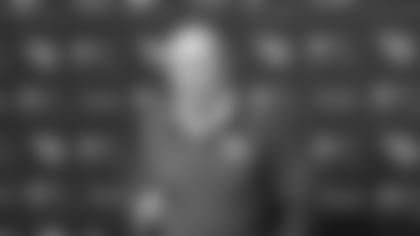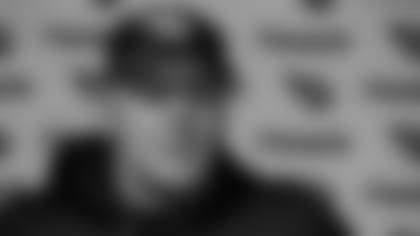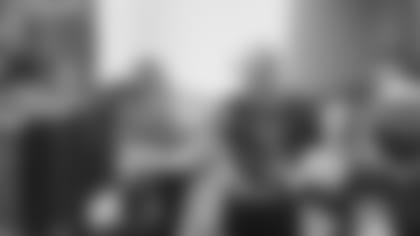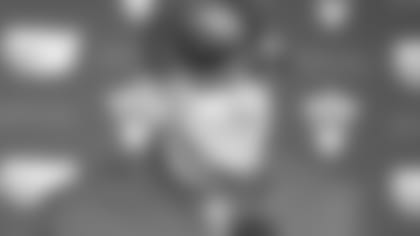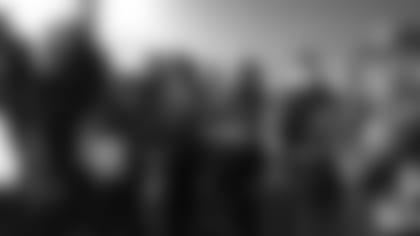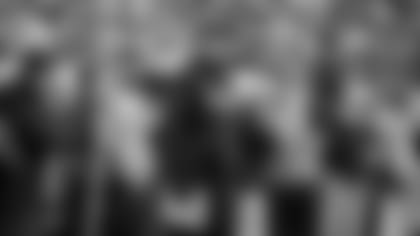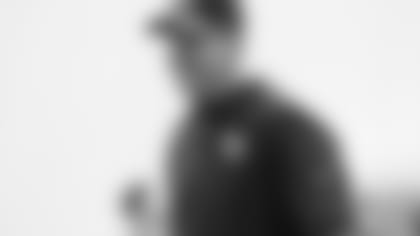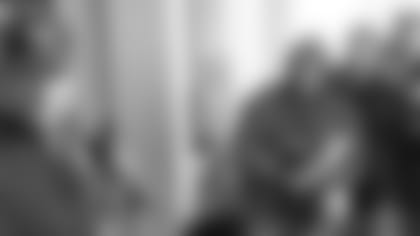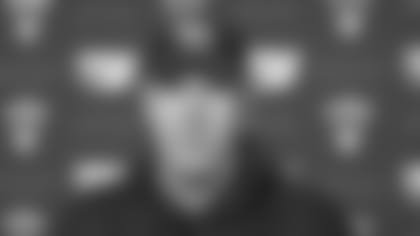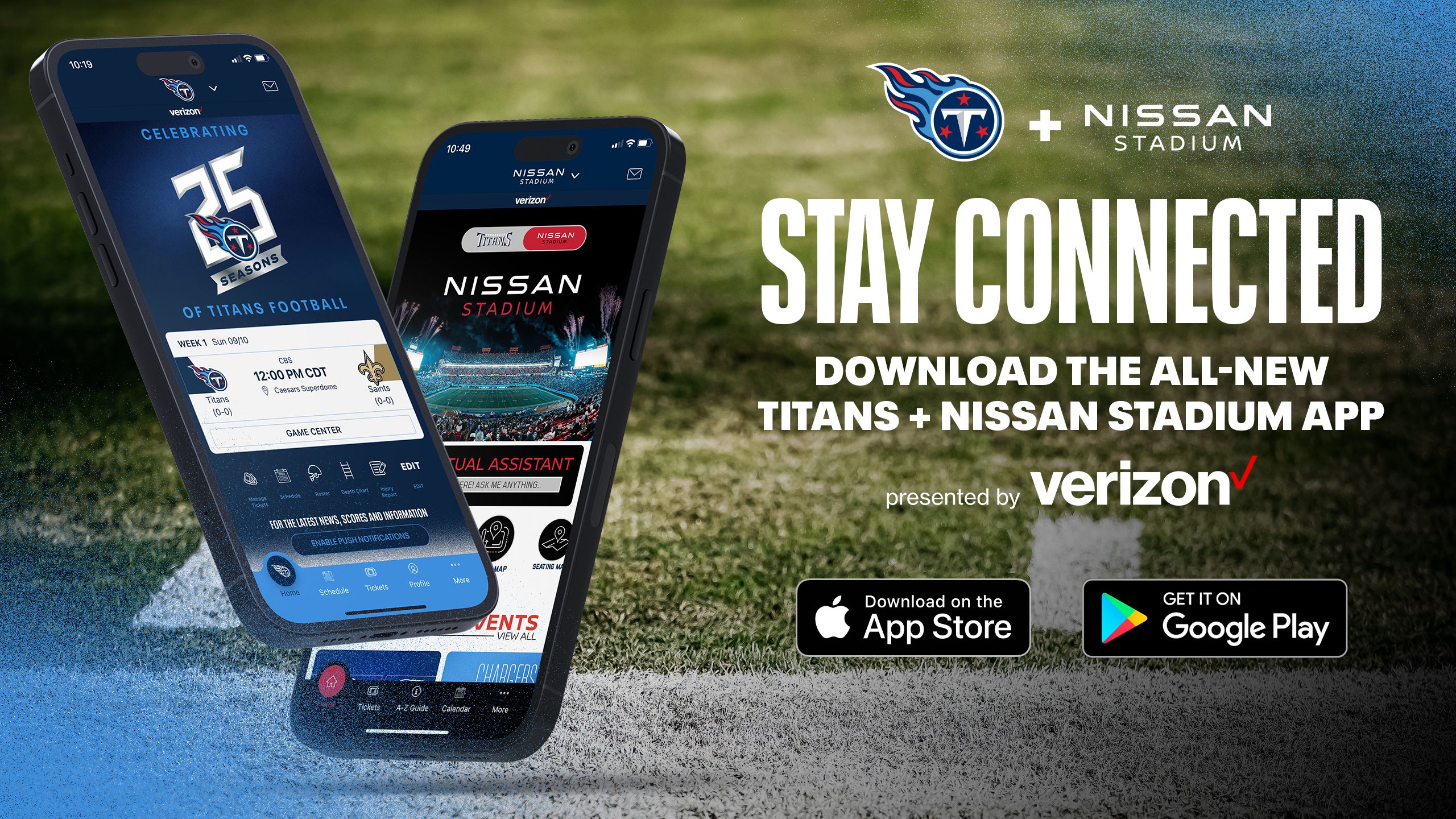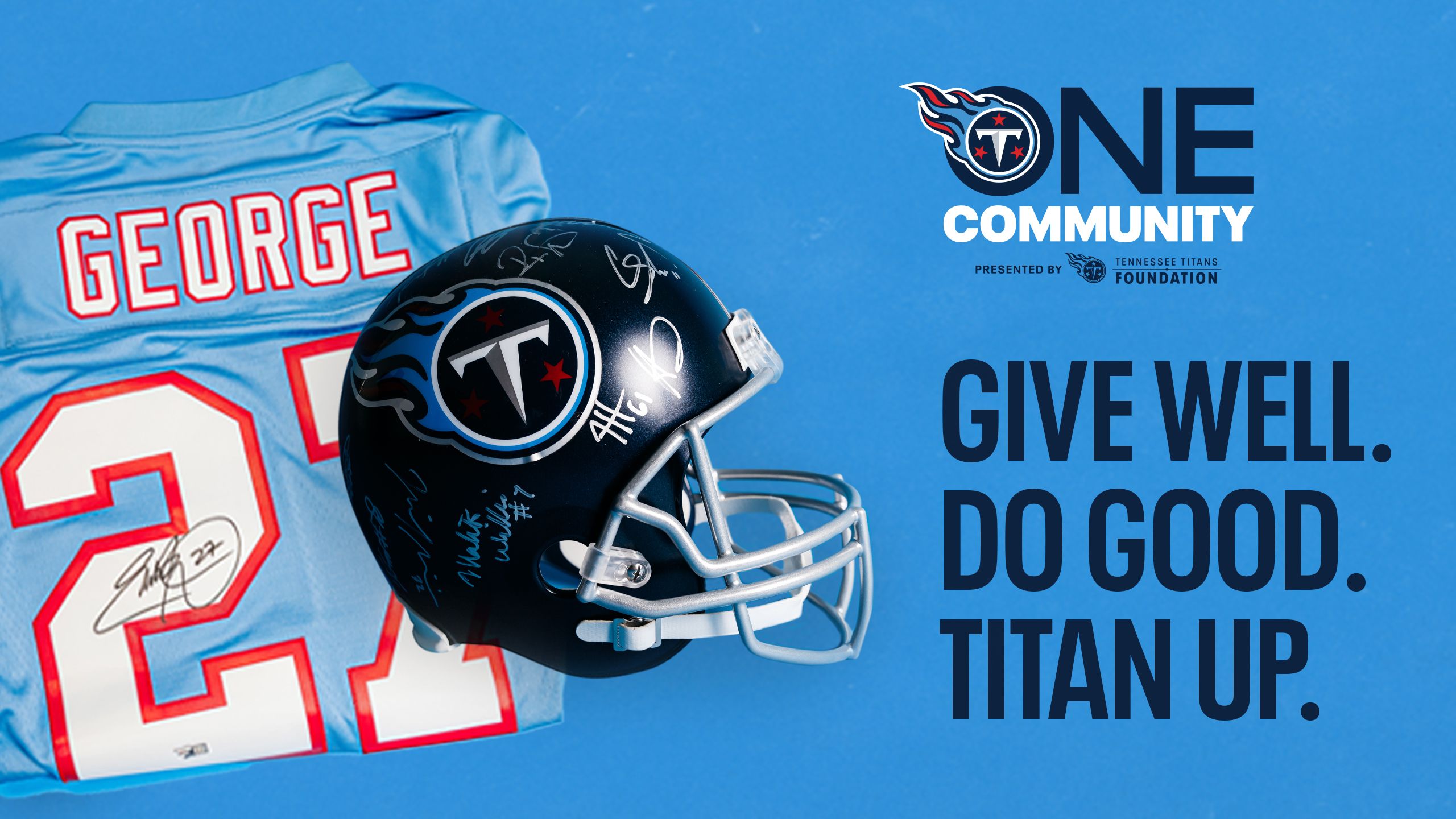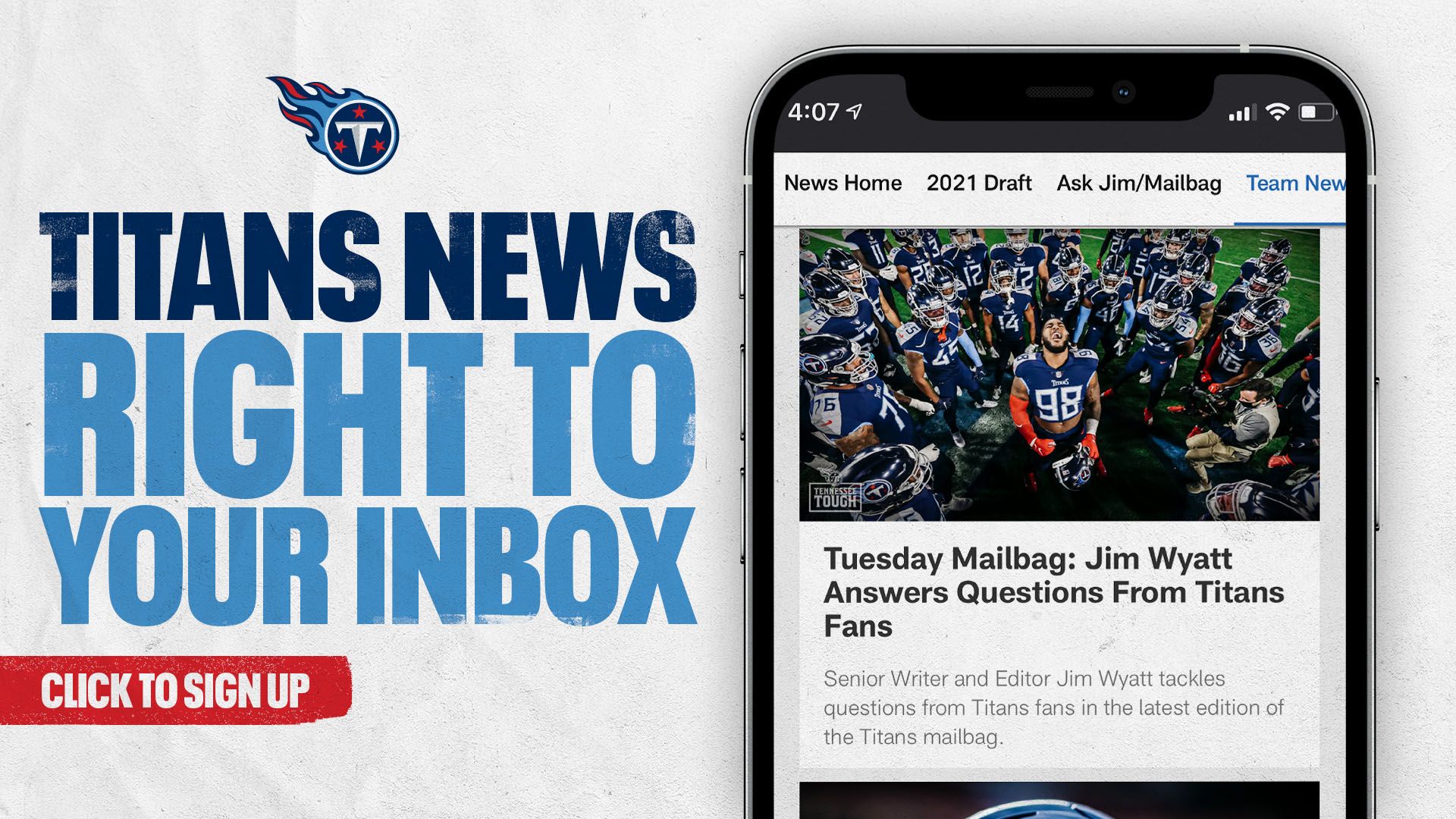**
 |
**
I have just a couple items I want to start off with and tell you how the 50th anniversary of the AFL , how it all got started. Bunker Hunt who was a brother to Lamar Hunt, he called me from Dallas and said Lamar wanted to come down and see me and talk to me about something. I said, 'Well, what does he want to talk about, Bunker?' and he said, 'He doesn't tell me what he wants to talk about and I don't tell him.' I said, "Well have him come on down and we'll meet.' Lamar came down and I took him to a restaurant I own and we talked about everything, football was never brought up. When I was taking him back to the airport to go back to Dallas, he said to me just before he got out of the car, 'Mr. Adams, did you try to buy the Chicago Cardinals?' I said, 'I sure have, but I didn't have much luck.' He said, 'I did too,' and I said, 'I didn't know that' He said, 'Yeah, I did and I didn't have much luck. What I've asked you and I'll just ask you now before I get out to get on my plane, would you be interested if we formed a new league?' I said, 'I sure would.' He got out and said, 'I'll be back in touch.' Well that was the very beginning and then we started working in earnest to get things started. What happened as we started out, we had a press conference in my office in Houston and said that we were forming a new league called the American Football League, the AFL, and there would be other teams. There would be two teams starting now, Lamar Hunt with a team in Dallas and Bud Adams with a team in Houston, and there would be others forthcoming. It wasn't very soon after that, that a lot of calls started coming in and that's when we finally got to what they became, the Foolish Club, the eight members that were going to start two divisions, four in each division, eastern and western division. We had our first draft up in Minneapolis, and Minneapolis at the beginning would be one of our teams. They got up there and the speaker up there told me that George Halas of the Chicago Bears was in the hotel and wanted to talk to me. I said, 'About what?' He said, 'He wants to offer you a franchise in the NFL,' and I said, 'My god, I'm committed to this thing here and we've got eight people ready to have the draft.' He said, 'Well, we're going to accept it.' I said, 'Well, why would you do that?' He said, "It's only $865,000, that's a pretty good price at this type of game and we're going to take it up,' and I told him, 'I'm not interested in talking to George Halas and I've committed myself to this thing and we've gone through with it.' The next day when we had the draft I told him that we had to go ahead and draft for whatever team is going to come in and take their place. That turned out to be Oakland. So we had the draft and what we did is we took that magazine Street & Smith, I think the only guy (John Breen) that was really knowledgeable about football players coming out of college. I hired him in October of '59 when he was down scouting in Waco at Baylor College and he told me, 'I just read in the paper that you and Lamar Hunt were going to start a new league up, who do you have working for your team? I know that you tried to buy the Cardinals here, and you didn't have much luck,' and I said, 'No, I didn't and Lamar tried to buy them too.' He said, 'Well, I'd be interested in going to work for you if you're interested.' He went to work, John Breen was his name, and that was in October of '59. We had the draft up in Minneapolis in November, and we drafted for the eighth team that we didn't have, which ended up being Oakland, and we'd be off to the races.
Another interesting thing is I got Billy Cannon in the first draft. He played at LSU and was an All-American and Heisman Trophy, two-time All-American. His high school in Baton Rouge was the first high school to take up weight lifting and LSU took it up. I hadn't been able to get Billy on the telephone since that draft we had up in Minnesota, so I called his trainer he was training with in high school and LSU as well and I told him, 'I couldn't get Billy on the telephone.' He said, 'He's been awfully busy Mr. Adams, he had the All-American and the Heisman Trophy.' I said I knew the L.A. Rams drafted him and he still had another game to play, in-fact LSU was going to play Mississippi in the Sugar Bowl game down in New Orleans and they're not suppose to sign anyone, no NFL teams signed anyone before their college career is up. Now, so I don't think we'd have any problems there. I said, 'The main thing you need to tell Billy is that if he did sign with them, I'll pay him twice what he got up front and for whatever contracts he has, I'll pay him twice that.' I was home at the time and I'd had the idea to do that so I told my wife that I'd probably have a phone call from Louisiana within an hour. Twenty-two minutes later the phone rang and the operator said, 'Mr. Bud Adams, I've got a collect call from Baton Rouge, Louisiana.' I said, 'It's from Billy Cannon isn't it?' She said, 'How'd you know that?' I said, 'I just do, my brain told me he was going to be calling me. I'll accept it.' We got on the phone and he says, 'What is this about twice as much money?' I said, 'Did you sign with them?' He said, 'I sure did.' I said, 'What did you get for your upfront money?' He said, 'I got $10,000. Are you going to give me $20,000?' I said, 'I sure will. What about your contract with them, what did they give you?' He said, 'They gave me three one-year contracts at $15,000 a year.' I said, 'It's just like them to do that, you know what that means don't you?' He said, 'No, what's it mean?' I said, 'It means if you get hurt in that first year and you don't pass your physical the next year, they don't have to pay you for the last two years unless you pass the physical. He said, 'I didn't know that.' I said, 'How much was it for?' He said, '$15,000 each year.' I said, 'I'll give you a three-year contract at $30,000, $30,000, $30,000, that's $90,000,' and he said, 'What do I have to do.' I said, 'You got to get over here and we have to have a well understanding and everything.' He came over and I picked him up at the airport and we talked it over, what we'd do, and we signed him under the goal post at the Sugar Bowl. I said, 'I want you to go home with me here in my wife's car and meet her and I'll take you back to the airport.' What happened was on the way back to our house he said, 'You know, my dad works at that refinery in Baton Rouge and doesn't make a whole lot of money and he's always admired the Cadillac and he'd love to have one before he dies, but it doesn't look like he's ever going to have one. I'd like to be able to take this home to her.' I said, 'C'mon now Billy, what else are you going to ask me to do?' He said, 'That's the only thing, the other things I'm satisfied on.' I said, 'OK, Nancy, my wife, is cooking something for us to eat and I'll give you the key and we'll go in the house and you get in the front door, then get out of there and head on back.' Nancy came out from the kitchen and said, 'Where's Billy? I got some things put on the table.' I said, 'he's already headed, he had to go on back to Baton Rouge.' She said, 'Well, I didn't hear the doorbell ring or anything, how'd he go?' I said, 'Well, he got in the car and left.' She said, 'Wait a minute, he got in the car and left? You were driving my car, weren't you?' I said, 'Yes. He's in your car. You don't have a car now, but I'm going to go down and buy you a new one tomorrow, I guarantee it.' She wasn't too happy about that. We went out to celebrate Billy Cannon because we were getting the best player in the nation right there. What happened, we went out to celebrate that thing and I bought her a new Cadillac, a blue one that was convertible because that's all they had, they didn't have a regular one. We drove out to the club at Hilton Hotel that Barron Hilton owned, Barron was one of the owners of the L.A. Chargers and was competing with the Rams out there. Well, we left there and went to another at about 1 o'clock in the morning to another one and stayed out until 3 o'clock in the morning. We heard the sirens about 2:30 outside and we asked the guy what was going on out there. He said, 'Well, some car caught on fire.' Back then we all smoked and what happened is we had the top down in the new Cadillac convertible and she had thrown her cigarette thinking she had thrown it outside the car, but it went right in where the roof was and it was burning like mad. I said to her when the guy told me it was a blue Cadillac convertible and I thought my wife was going to hit me in the head. I said, 'you can do what you want tomorrow, I'm staying out of it just buy it and send me the bill.' That was the Billy Cannon story.
Another one I want to tell you about is Tom Landry with the Giants. He was one of the coaches up there. When two of his players were up for renewal, I'd flown up to New York and got a hotel room. Had him up there talking to him [Landry]. He really liked his job there and thought he would maybe get another head coaching job, if not with the Giants, with one of the other NFL teams. And then, there was a knock on my door. It was those two players of his that I had told to come up came up a little earlier than they were supposed to. He said, 'Who's that?' I said, 'that is two of your players that's contracts are up.' He said, 'I can't be seen here with you.' I said, 'Well go on in the bathroom. I'll get rid of them right away and postpone my meeting for later on today.' So he was in the bathroom, and I told the guys when they came in, 'Really I've got to go to another meeting but I can meet with you in about two hours and tell me where to go.' So they got ready to leave and one of them said, 'well, I need to go to the bathroom. Is it alright to use the bathroom?' I said, 'wait a minute. That door, it sticks. That door sticks. You might get locked in there.' He was already over there. He said, 'Let me try it.' He turned the handle and it wouldn't open. He had locked it. Thank God. I got out of that one pretty easily.
But one of the most interesting was Joe Namath when we had played for the Jets. They were in Super Bowl III down in Miami. Draft week, we got names. We picked them out of a hat. A lot of the teams weren't that familiar. They didn't have the people like they have in Street & Smith's to show which ones to pick. So I had gotten Namath out of mine on my first pick. When I called him, he said, 'I'm a New York man. I want to play in New York. Where the lights are big and fast and everything, or Chicago or Los Angeles. Houston, I don't know too much about Houston.' He wasn't that interested. So I made a trade when I saw I wasn't going to do anything good with him. So I traded with the Jets up there. They were the Titans to start out as you all know. The guy ran out of money. They sold it and played in Super Bowl III down in Miami and Namath won that game for them down there. I always said to myself that I made the right decision because it gave us the first victory over the NFL in Super Bowl III.
Now, I have some other things here but I'm going to open it up to any questions you all might have. Like, how the game has changed in the past 50 years or if there was a time where you thought the AFL might not succeed. Whatever you want to talk about and I'll be happy to see if I can answer your questions. So, are there any questions?
**
(on the name of the restaurant where Bud Adams met Lamar)
**
It was called the Charcoal Inn. We had a bar in there. I had a guy that had the free newspapers down there. He had a column in the press one where he took pictures all the time of social people around town and wrote a story about them, what they all love to see. So when I was looking for a guy to be my manager there, I asked him if he would take that job on and I'd give him quarter interest in that restaurant. Well, he did it and he took pictures of all of them. We had them put them on the wall and I think in that first month in business, we made a thousand dollars. So I said, 'That guy is doing me a hell of a job.' The only thing is he ran out of strength after about three years with the newspaper and doing that one. So I had to buy him out, but the restaurant really did well with him running it.
**
(on his conversation with Hunt before bringing up football on the way out)
**
Well, I didn't know Lamar. I knew his brother Bunker from Culver (Military Academy). I had lettered in three sports up there; Football, baseball and basketball; He was always a big rooter on the sidelines, Bunker was. I had talked to Bunker several times, but I never talked to Lamar until Bunker told me that he wanted to come down and speak to me in Houston about something but he didn't know what it was. Because, he never told him anything he did, Bunker said that and Lamar never told him. That was in '59 that he came down and talked to me.
**
(on if or when he ever had doubts the league would be successful)
As the league got going and the fact that we had Billy Cannon, the number one player of the L.A. Rams, we had some pretty darn good players. When I went up to see George Halas at his sports store, he said that you know they had got their new television contract in '58 out of their first contract and they weren't ready to share that money and then we were able get with NBC. We got a contract on our first year. I think it was the first year. And that really did a lot of help for keeping this thing going. Actually our main effort was to maybe get a merger with the NFL and when I went up to visit George Halas he said I know some of our people aren't willing to share the TV money we are getting, television money. So the price started going up on players, because we were trying to sign a lot of players. So what we did then about the third year, I think probably '63 or '64 we got four on one side of the table four on the other. I was sure, I said the only way we can get them to think about taking us is we got to start signing some of their players. The four on the other side, Lamar (Hunt) didn't want to do it and said we just better fight this on our own. I said well they aren't going to be interested in ever letting us come in. Pro football is getting a lot of good acceptance across the United States with our new league in which we have eight teams and I said the only way we're going to get them interested is we got to start signing some of their players. So that's what we did, the four on our side and I. The first guy I signed was Mike Ditka, up in Chicago. Talk about a tough one to deal with, that Mike Ditka was one. But he signed a contract and that kind of blew George Halas up pretty badly, I think. I signed about another three top players across the country. By then the NFL started listening to us a little bit more. What would it take, what would we have to pay them to come in? I think in '65 they came to us, I think that was the year is was, they said that they were willing to talk to us and get some of the preseason games together and finally come up with what we'd have to pay them. We kind of got it, they didn't want us to sign any more of their players, so I think that is what brought them around to us was the fact that we were taking some of their good players and when their contracts were up they were willing. They were able to keep all those guys we signed when we started playing together in 1970, years go by so fast I can't keep up with them. Anyway, we played preseason games for three years there and one of the things I was very anxious to do was with the Dallas Cowboys who were owned by, (Clint) Murchison was his name. The commissioner (Pete) Rozelle was talking with him and I told him I'd like to have the Cowboys to play three preseason games as a part of the merge, play them in Houston for the first three years we play. Murchison didn't want to do that. I told him I said I'm getting the governor of Texas to get this great big statue trophy about five feet tall and Murchison said he didn't want it. Anyway, he came around and agreed to do it. I said you're going to win it anyway, you got a very good team up there. That first year we played in 1970 (actually 1967) and actually in the preseason game, they beat us. It was played in Houston. I called down to his suite, and I said I got the trophy to give it to you. I'd like to meet you and give it to you down on the field. He said no I don't want to go on the field. So I went by his suite there after the game. I said the governor is giving this out we got to get you with it and take a picture and send it to the governor. He looked at it and said well that is a pretty nice looking trophy. And so anyway the next year in 1961 (actually 1968) he won it again, and we got another thing to put on to the bottom down there to show who won that game again. He was a little bit more happy about it after that. So that was a little interesting outcome. I think the beginning of signing some of their players was the thing that switched them around to thinking that maybe it's time to go ahead and take us in as a partner. When they came up with the figure, it was two million dollars per team. I about fell over dead when I heard that. But they were going to give us 10 years to pay that off. That would be 200,000 a year, for each team. We had 10 teams at the time. They had 16 teams. So when it came time to go ahead and do the deal, three of their teams were going to move over and become AFC, American Football Conference and three teams would make it 13 and 13 starting out there. We had 13 teams, and they had 13 teams, which was 26 teams. Now we are up to 32, you know. But it made it very good, because we had three divisions. Four teams in two of them and the other was five, and they had four, four and five. And it worked out real well. It made the league stronger. They were good cities that we were in, big cities that we called it the "foolish club." With all the eight members in there, you know the eight members that started out, myself, Ralph Wilson with Buffalo, Lamar Hunt in Dallas, Bob Howsam in Denver, and Charles they called him "Chet" Soda with Oakland, Barry Wismer was radio announcer that had the New York Titans, and then Bill Sullivan who was at Notre Dame as their PR guy, got that group together up in Boston where the Patriots are. Barron Hilton had L.A. , Los Angeles Chargers the first year, but he was competing with the Rams. That second year in 1961 he moved it down to San Diego and it became San Diego Chargers. That's about where we were on the teams. What other questions might you have?
…
(on coming up with the "Foolish Club" name)
I think Lamar (Hunt) is the one that brought it up, as the foolish club. At first we weren't sure if we wanted to be called the Foolish Club, but I said I think maybe we are and we'll find out in a hurry how foolish we were. And everyone was feeling pretty good about it. When they put the pictures of the eight individuals and stated it as "the foolish club." They were all having a big time at it.
(on the "Foolish Club" Christmas card)
They did use it as a Christmas card, I forgot which one it was.
(on the influence Tom Williams had on AFL players and scouting small schools and black colleges)
I think this did open up a lot, the college players are playing harder than they had been because there were only maybe when we started out maybe 16 NFL teams. But what happened when the new league started out with eight new teams, it made the college players who never thought they could get into the National Football League say that they could make it and get into a team. So it opened it up for more players working harder, working out more, become stronger, play harder and they knew the salaries were going up every year and was a way for them to get more players drafted with our eight teams, and then we get up to where we had 10 and they had 16 for 26 teams. It was more advantageous for smaller schools but when you look at some of those players before, now those players were coming out of the woods to be seen. They worked so hard and some were pretty great players that never thought they could get into the NFL so they didn't try that hard. It was a new opportunity for pro players in the sports. The demand for tickets started going up very fast making the NFL and AFL when they merged. Pro football was getting to be the number one sport, of course over baseball and basketball. Baseball was always the most popular, but I think right now with the vote taken pro football is the number one pro sport out there.
(on AFL innovations)
The NFL was pretty restrictive in the things they did and we had guys come in from some of the clubs they had back then when you could have a general manager and 34 limited partners, one guy or two guys had owned the majority. But they had 34 other people in there, some of them very wealthy and they all had ideas. We would all take this into consideration in annual meetings some of these new ideas they had on uniforms and things like that. I could see where the NFL was pretty well set in their ways and that's the way they wanted it and they didn't want to change it. They had no reason to change it. I think we forced some changes on them pretty quick to the things we were doing with our teams. That's what I think came out of this whole thing that made it better teams, harder working teams. If there was a black running back that could outrun the white guy, we went for them you know. The other NFL teams weren't looking at them as much as we were. We found that back when we started we got some great black running backs, wide receivers with unusual speed that came out of the woods with what they could do and we were willing to take them on for our teams.
(on Ralph Wilson getting into the Hall of Fame)
I think that is fantastic that he is going in. He's certainly needs to, he's one of the original eight founders of the American Football League and he deserves to go in. And I'm looking forward to it. I'm still on the board up there, so I'll be up there. We are playing up there this year. We're playing the Buffalo Bills up there. We'll be wearing our old Oilers uniform and they'll be wearing their old Bills uniform. And when we play the Jets up there in New York they'll be wearing their Titans uniform and we'll be wearing our Oilers uniform. We have a lot of little things we are working on but I think it's great that he's getting in the Hall of Fame and it's a great honor to have. He's well worth it too, to get in.
(on Ralph Wilson's contributions to the AFL and if he helped some individual teams with loans to keep the league afloat)
**
Harry Wismer, when he was about to blow all of his money, you know, I'm not sure what Wilson put up with him. I know when we played one game with him his last year, I think it was '63, he came over to me, he played in that baseball park up there and said, 'I don't have the money to pay you what you should get for this game.' He just wasn't drawing that many people. In fact, I wrote him a check for $10,000 right there. He endorsed it and it gave it right back to me. He said, 'that will get me by.' I think Ralph helped him out too. Harry Wismer, he had quite a bit of money to start off with but he blew it pretty fast because prices were going up on players and everything was costing more money too. Did I answer your question?
(on making the decisions for coach and where the franchise is now, in the number one league in the country)
**
One of the things that is real important is that while the game has changed, pro sports teams and college players are working harder and play tougher. They want to become a pro player because pro football players in our league now, with all of the teams that have been added on, are all doing real well as far as selling out stadiums. In fact, every stadium has to be sold out if they're going to have local television. Most all of the stadiums do. I don't think there are any stadiums that don't sell out there regular ticket sales, one way or another. The fact it's grown in value with our television it's been one of the most important things that has brought in higher TV monies. The business is better now, the athletes train year round. It makes a better product out of it. That's what's changed in the last 50 years. They work at it a little bit harder and have more to offer.
**
(on teams struggling to sell out the games in the early 1960's, how did you combat that with Dallas deciding to move to Kansas City)
**
I think they found the Cowboys were too tough for them to battle there. They did move to Kansas City which was a big plus for them and Kansas City was really pleased to get them and built the new stadium up there. It is the same thing with Barron Hilton when he was with the L.A. Chargers, fighting against the L.A. Rams, it was difficult for him. Even when the Oakland team moved down to L.A., you'll remember they moved back in about three years it was too much competition for them down there. I think what happened there, by moving out, the Cowboys situation, Lamar didn't want to leave there but figured it was too competitive with them. The Cowboys were a pretty good team and there was too much competition to have two NFL teams in one city the size of Dallas. The same thing kind of for the NFL team out in L.A., L.A.'s a big city, but back then things were a little bit different and that's why they moved to San Diego the next year. Oakland didn't stay down in L.A. too long down there against the Rams. They didn't get what they thought they were going to get. They moved back to Oakland, you know.
**
(on winning the first two AFL Championships and playing in the AFL Championship game in 1962 against Dallas, the longest football game in history)
**
It was a double overtime, the first time in pro ball it had ever been done. They beat us 20-17, there was three points because they kicked a field goal. In fact, we thought we were going to win that game, but we didn't. That's kind of like that game with Baltimore last year. We only had three losses in the regular season and thought we were going to be in the Super Bowl, but things can happen down on the field and changes all that. It kind of surprises you sometimes.


